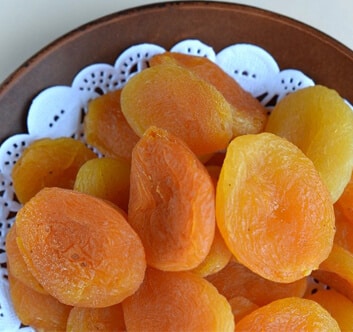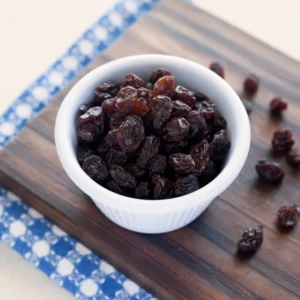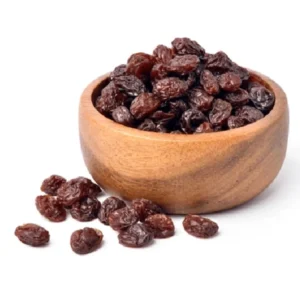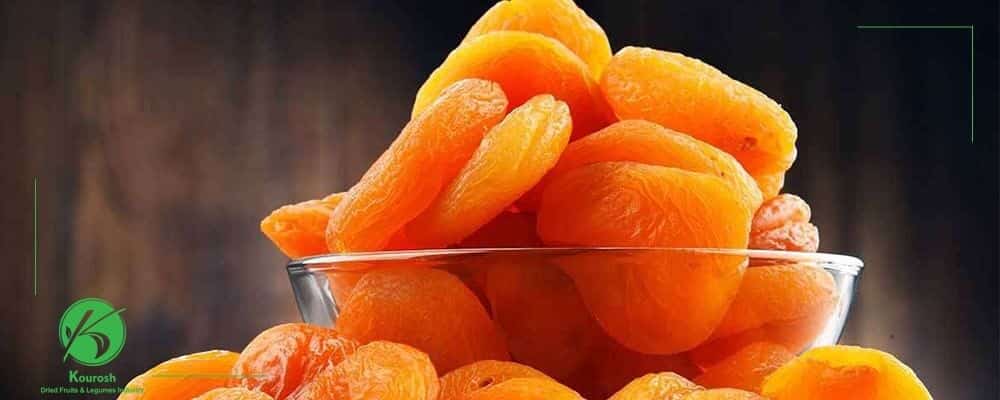
How much dietary fiber is there in organic dried apricots? What are the best-dried apricots? Apricot is a soft, fleshy, yellow fruit from the rose family that ripens in early summer, commonly referred to as golden summer apricots.
This fruit is native to China apricot is a Latin name for it. It was introduced to other parts of Asia and Europe in the early first century AD. The apricot tree reaches 6 meters in height. Its leaves are heart-shaped and yellowish-green. The apricot flowers are relatively large. Apricot kernel is smooth, brown, and oval, and located within the hard endocarp. The taste is sometimes sweet and sometimes bitter.
What are dried apricots?
iranian dried fruits and nuts, like other fruits, is rich in nutrients such as fiber, vitamin A, vitamin C, and potassium. Other nutrients in apricots have been shown to reduce the risk of stomach cancer by up to 47%.
The nutrients in 1 piece of freshly dried apricot (35 g) include:
•Calories: 8.16 g
•Protein: 0.5 g
•Carbohydrates: 3.9 g
•Sugar: 3.2 g
•Fiber: 0.7 g
•Fat: 1 g
•Potassium: 6.9 g
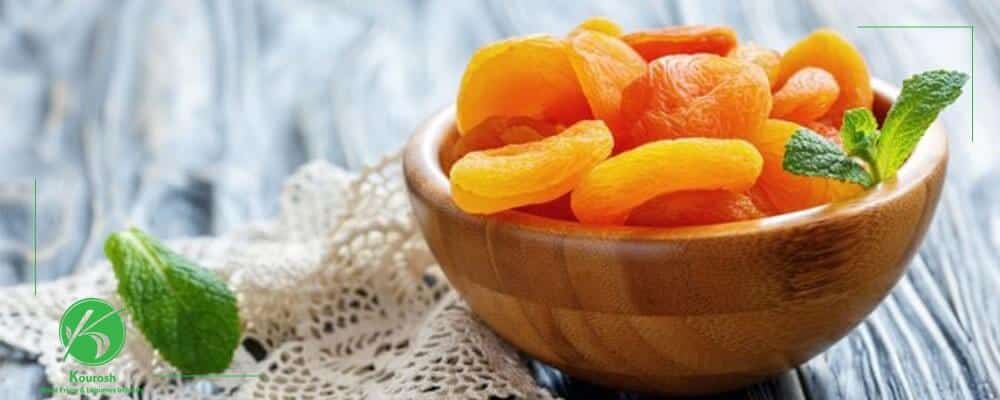
Health properties of dried apricots
1. Alleviate eye disorders
Beta-carotene and vitamin A in dried apricots reduce the risk of eye disorders and diseases that can cause vision loss. The presence of zeaxanthin in dried apricots also prevents macular degeneration in the elderly.
2. May improve heart function
Like many other fruits, apricots contain vitamin C, potassium, and fiber, which help keep the cardiovascular system healthy and prevent problems such as heart attacks and strokes. Vitamin C protects the heart from free radicals. Potassium also lowers blood pressure. The fiber in dried apricots reduces excess cholesterol on the walls of blood vessels. All of these substances promote heart health and improve its function.
3. Treating anemia
Dried apricots contain a large amount of iron, which is effective against anemia. Anemia is essentially an iron deficiency and can lead to general weakness, fatigue, lightheadedness, and poor metabolic function. Without red blood cells, the body cannot get the oxygen it needs.
4. May promote healthy bone
Apricots contain valuable substances such as calcium, phosphorus, manganese, iron, and copper. These substances are essential for the health and growth of bones. Thus, eating this delicious fruit will ensure that you have healthy bones while preventing osteoporosis and osteoarthritis.
5. Moisturizing the skin
The vitamins C and A in apricots are known as natural skin moisturizers that can be applied to hands and face. Apricot kernel oil is also great for hydrating the skin due to its high source of fatty acids and vitamin A. It can, therefore, be used as a moisturizer to treat dry skin.
6. Help to lose weight
Apricot is a low-calorie, high-fiber fruit that helps the stomach feel full and function better. Forty grams of dried apricots contains 10 grams of fiber. Fiber is digested slowly by the body, and so it prevents overeating and promotes weight loss. Therefore, it can be a good part of any weight loss program and diet. So, if you want to lose weight with a healthy diet, you should include dried apricots in your food basket. Eating a few of these dried fruits every day will provide your body with essential nutrients and accompany you on your weight loss journey.
.

7. Treating constipation
Consumption of dried apricots promotes digestion and prevents constipation. Dried apricots are rich in pectin and cellulose, which act as a natural laxative and soften stools by increasing bowel movement. They also increase the amount of dietary fiber and accelerate the movement of waste through the large intestine. One of the benefits of eating dried apricots is easing bowel movement. Dried apricot is a natural remedy for constipation. Constipation is one of the most common digestive problems that can afflict anyone. However, you generally do not need to see a doctor to relieve constipation. Eating a few dried apricots may be all you need.
8. Have several benefits during pregnancy
As mentioned earlier, dried apricots contain many nutrients for human health, especially in pregnant women. Dried apricots can promote the development of the fetal nervous system and prevent premature birth. Dried apricots contain iron, which can help improve blood health and prevent anemia in pregnant women. A woman’s blood volume increases by 50% during pregnancy. It means that she needs more iron in her diet. Pregnancy and lactation may cause metabolic changes in the body. Low physical activity or an unbalanced diet can often lead to constipation. Drinking enough water and eating fiber-rich foods, such as dried apricots, can alleviate digestive problems. Many pregnant women experience anemia and other health problems during pregnancy. Consumption of dried apricots can help eliminate such conditions.
9. Treating colds
Dried apricots are rich in vitamin C, which strengthens the immune system and is helpful for the prevention and treatment of colds, asthma, tuberculosis, and bronchitis
10. May promote liver
Studies show that dried apricots’ beneficial nutrients are effective in treating and preventing some liver diseases. Such as fatty liver disease (FLD) by increasing liver activity. The effects of apricots on the faster excretion of waste products from the body helps with the liver detoxification function.
Dried black apricot is also a dried fruit of apricot. The only difference with an ordinary dried apricot is in the type of drying process. Ordinary dried apricots are usually dring in industrial fruit-drying machines in the presence of sulfur dioxide (to preserve their texture and golden color). But dried black apricots are dried in direct sunlight over a longer time. According to studies, direct sunlight does not negatively affect apricot quality and properties. Its properties and nutrients (such as water-soluble vitamins) are preserved better in black apricots. Overall, dried black and ordinary apricots are similar in terms of properties and health benefits. After receiving information about prunes, it is better to read about What are the health benefits of dried fruit?
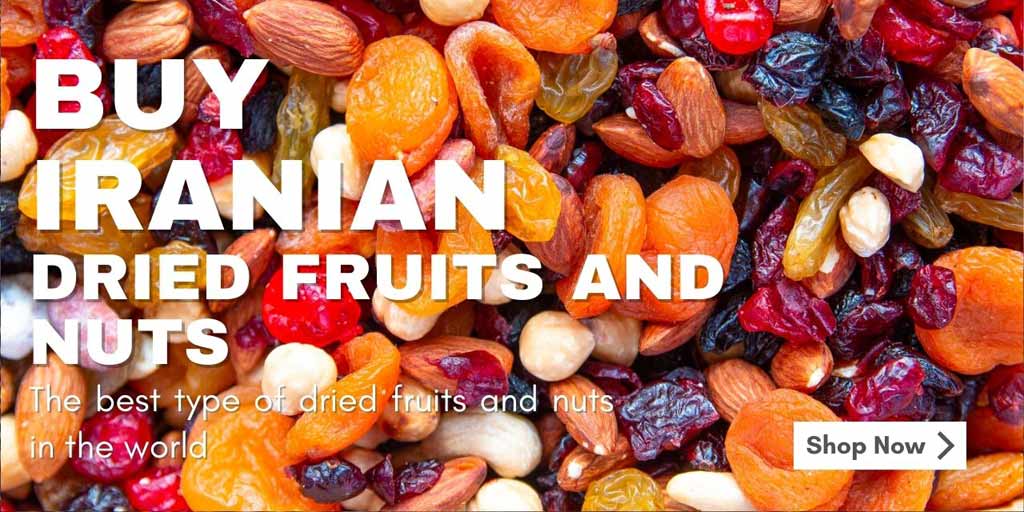
What are the beneficial properties of dried apricots?
Dried apricots are high in calcium, potassium, phosphorus, vitamin A, iron, and vitamin C. Moreover, dried apricots make it possible to taste this fruit out of season. A cup of the apricot kernel can supplement your diet with 323 calories. Calories are energy in the form of glucose that the body needs. When the body is tired, getting calories helps provide the necessary power for the body to function. Like other dried fruits, dried apricot contains many nutrients such as dietary fiber, vitamin C, vitamin A, beta carotene, iron, and potassium. Consumption of 3 dried apricots provides about 50 calories. Dried fruits are popular, have a long shelf life, and are available all year round.
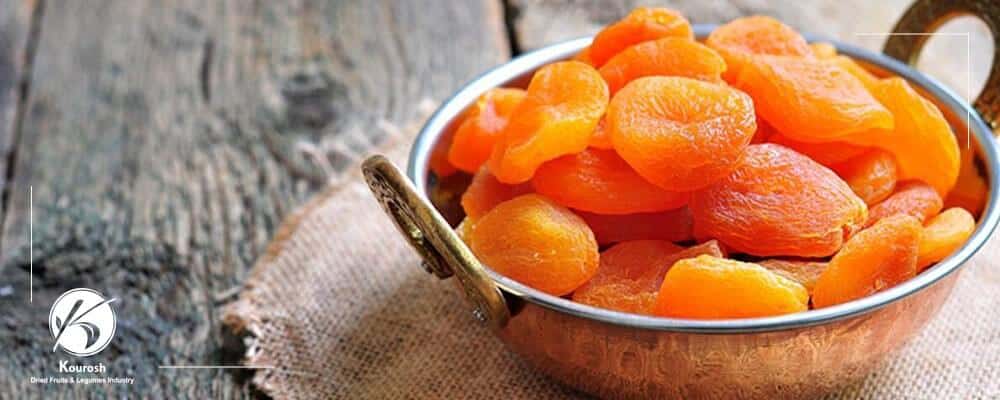
How to dry apricots?
There are many ways to dry apricots. Some of the most practical methods are explained below.
Method one: Sun-drying
This method is one of the traditional methods used for food preservation and needs a temperature above 23 °C or 73°F.
At first, Apricots are carefully picked, then washed to remove any toxins, dirt, and pests from the skin. Then, the kernels are removed, and the fruit is cut into equal pieces.
Next, the apricots are placed on a baking sheet. They do not stack on top of each other. Using a pastry plate is recommended for ease of cleaning.
The apricots are then covered with a mesh cloth and placed in the sun. The cover protects the fruit against air and insect pollution.
The drying time in this method is 2 to 4 days. To prevent dewdrops on the fruit, you can bring them inside overnight.
Method two: Oven-drying
such as the above recipe, first, the apricots are washed, remove the kernels, and cut apricots into equal pieces. Then, they are placed on a baking tray. Set the oven to 65°C. In this method, dried apricots can be prepared after 12 hours.
You can store them easily. Keep dried apricots in sealed containers away from sunlight
.

